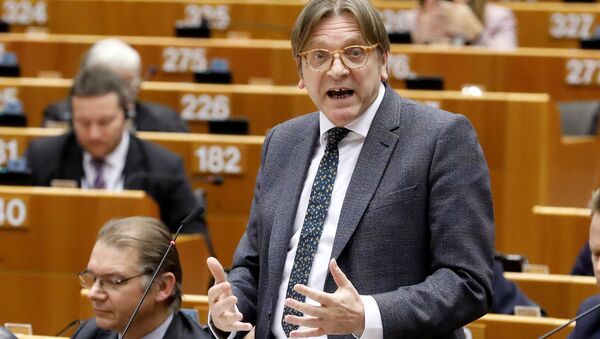Verhofstadt — an arch europhile and federalist — is set to lead the negotiations over Brexit on behalf of the parliament. However, the talks will initially be led by the Commission, under Michel Barnier, the EU's chief negotiator.
It will also be negotiated at Council level, with its president Donald Tusk leading. In spite of the complications of having three negotiation parties talking to Britain, Verhofstadt says parliament will have the final say.
"We vote no — that is possible. It has happened in a number of other cases that a big international multilateral agreement was voted down by the European Parliament after it was concluded. The fact that in the treaty it is stated we have to say yes or no doesn't mean that automatically we vote yes," he told the BBC Today program.
He also held open the possibility of "associate" EU membership for British citizens after Brexit. He said British citizens could opt in various EU benefits, including the freedom of movement.
Many UK citizens devastated their European identity is being taken away. I will fight for their voices to be heard https://t.co/xdKBPRiWzj
— Guy Verhofstadt (@GuyVerhofstadt) 10 March 2017
"All British citizens today have also EU citizenship. That means a number of things: the possibility to participate in the European elections, the freedom of travel without problem inside the union. We need to have an arrangement in which this… can continue for those citizens who on an individual basis are requesting it," he said.
He got into a social media spat with the former leader of the anti-EU British UKIP party, Nigel Farage who accused him of trying to use European nationalism to try to destroy the nation state.
Many British citizens tell me they are also proud European citizens. False to suggest there is a trade-off. https://t.co/0XyszK78RN
— Guy Verhofstadt (@GuyVerhofstadt) 10 March 2017
His remarks come as the other 27 member states — minus the UK — held informal talks in Brussels, March 10, to discuss Brexit, which is expected to be triggered by the end of March 2017, when UK Prime Minister Theresa May formally invokes Article 50 of the Treaty of Lisbon.
'It's Not the End'
At a press conference, March 10, Jean-Claude Juncker, the President of the European Commission said he regretted Brexit and held out the hope of Britain once again coming on board in a newly reformed EU, which he admitted — as is the growing term being used in Brussels — could be "multi-speed."
"#Brexit is not the end of the European Union. Brexit is encouraging the others to continue." @JunckerEU #EU27 pic.twitter.com/QARqO6B5N1
— European Commission (@EU_Commission) 10 March 2017
He pointed out that not all EU members were part of the Eurozone, or the Schengen open borders area. A new EU public prosecutor's office has the backing of only 18 or 20 member states, which opens that way for the EU to move ahead on some issues and not on others, while remaining a common union.
"It already exists. Not only as far as the euro and Schengen are concerned. The European Unitary Patent [scheme for harmonization of patents] is not a political objective and some of us are not joining it. The [EU Divorce Law Pact or Rome III Regulation] is only supported by 17 member states. Not all the members are launching it," Juncker said.
He also held out an olive branch to Britain, suggesting that — at some time in the future — it could once again rejoin a reformed EU. Asked about the effect of Brexit on the EU, he said it was "not the end."
.@JunckerEU "Enhanced cooperation already a reality today. Not meant to be dividing. Still moving in same direction." #FutureOfEurope #EUCO pic.twitter.com/3smFhwleME
— Mina Andreeva (@Mina_Andreeva) 10 March 2017
"I don't like Brexit, because I would like to be in the same boat as the British. The day will come when the British will re-enter the boat I hope. But Brexit is not the end of the European Union. Not the end of all our developments, nor the end of all our continental ambitions.
"I have the impression that — quite to the contrary — the Brexit issue is encouraging the others to continue. Unfortunately, we want the British. Brexit is not the end. I regret it. It's not the end," Juncker said.


